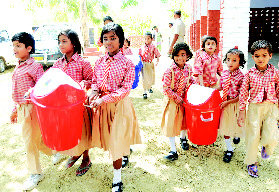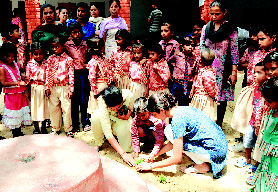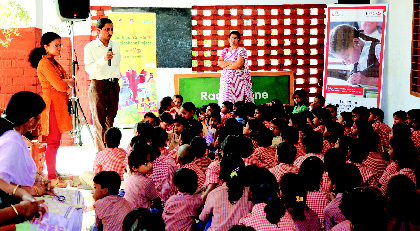Children admire, discuss, and even imitate her. She celebrates Diwali without crackers; she brushes her teeth every morning – and so do the children. She is Chamki, a protagonist of a popular animation series, “Gali Gali Sim Sim”. Like Chamki, other characters of the show—Boombah, Googly, and Aachoo—have also captivated the young minds.


Gali Gali Sim Sim, the Hindi language adaptation of an American puppetry television series- Sesame Street – has become a popular show in the City. A project that was started with a focus on just 10 families, has now reached over 1 lakh people. The show teaches poor children about health and hygiene.
The project has been run in three phases in the City. In the first phase, women in 10 families were given mobile phones with AM/FM capability, to listen to Gali Gali Sim Sim. Later, the programme was introduced through puppet shows in the government and NGO-run shools. Now, in its third phase, Gali Gali Sim Sim is broadcast on a community radio station of the City, “Gurgaon Ki Awaz”.
Serving migrants
The aim is to reach out to migrant families who have flocked to the City from around the country, in search of a better life. “In the last 25 years the City has undergone a rapid transformation, from a ‘Gaon’ to an IT hub, hosting major national and international companies. The city is dotted with big condominiums, that serve the residential needs of the families of people working in MNCs. We, however, cater to the families of people who work as drivers and watchmen in these companies,” says Arti Jaiman, Director of Gurgaon Ki Awaaz.

Aarti says that the migrant workers (almost 8 lakhs today) are uprooted from their traditional hygiene practices – such as taking a bath in the river, composting waste in the fields, and washing hands with ash. “They don’t know what to replace them with. Through programmes like Gali Gali Sim Sim we give them information in an interesting way, so that they get entertained and also adopt healthy ways of living,” informs Aarti.
Success stories
When Meenu Mishra, mother of a 6-year old boy, Gagan, was given a mobile phone, she was quite hesitant in using it. She was also not convinced that the programme would benefit her children.
However, in just two months she could feel the change. “It is easier to show children a video or a song, and then have them wash their hands.
When Boombah sings a song on the importance of hygiene, my children make sure they wash their hands and rinse their mouth before and after a meal,” says Meenu. Now, she also calls neighbourhood children to listen to the show.
Unlike Meenu, Madhu Kumar, a resident of Sheetla Colony, was quite excited when she was given a cellphone. Madhu, who works as a domestic help, took a couple of days to learn the functionality of a cellphone. Madhu’s children frequently fell ill. Regularly tuning in to the programme taught her children some lessons in basic hygiene. “Now, my children are much healthier, as they brush their teeth before going to sleep, and wash their hands before and after eating,” smiles Madhu.
After listening to an episode on the importance of covering and washing food items, her 7-year-old daughter, Kashish, made sure everybody in her family adopted this habit. “I love colouring pictures of Googly and Chamki, who always eat healthy and covered food items,’ says Kashish. She also reads stories of Chamki and Googly in school, as her school is a part of phase 2 of the Gali Gali Sim Sim project.
Recounting another success story in the City, a volunteer Vartika, says “A lady went to a doctor after watching the programme. As both her children were above 10 years of age, she was worried if they could still be given immunisation injections. When the doctor asked her what brought her to the clinic, she said she watched a Gali Gali Sim Sim episode on “Teeka” (dealing with immunisation).”
Vartika’s most memorable experience was with a child who did not know how to dispose waste. She taught him to use a dust bin. “The problem is that the parents of these kids don’t know how to dispose off waste in the City, because they never used dust bins in their village. They used to dispose waste in the fields,” says Vartika.
Successful in Mewat
The project is also a success in Mewat district. One of the extremely poor and conservative villages in the district, Nagina, is benefitting greatly from the show. The village does not have electricity, but in the evenings the children and adults gather around a mobile phone to tune in to Gali Gali Sim Sim on Radio Mewat – a community radio station of the district. “They laugh, they connect to the world, they learn various things – ranging from the importance of good nutrition to math lessons,” says one of the volunteers.
Not just health and education
A student of the government school in Sector 5, Seema, chuckles over the memory of one particular episode. It was about identifying emotions. “When Googly’s grandmother left her home, she was sad. Googly’s grandmother told her it was okay to be sad, and to talk to her mother. When Googly spoke to her mother, she felt better. I also feel sad when my grandmother goes to the village,” says Seema. Such episodes are made so that the children can easily relate to the characters.
“One of the episodes, that shows how Boombah and Chamki share food together, encouraged many children to share things,” reveals a volunteer. The show also addresses sensitive issues, such as sibling rivalry, and gender discrimination.
“As the City didn’t have any programme for poor children, we decided to have something educative on the radio. It has worked wonders in the City. We are happy that now children are learning, connecting, and questioning,” says Sashwati Banerjee, Managing Director of Sesame Workshop Initiatives India.
Read More...